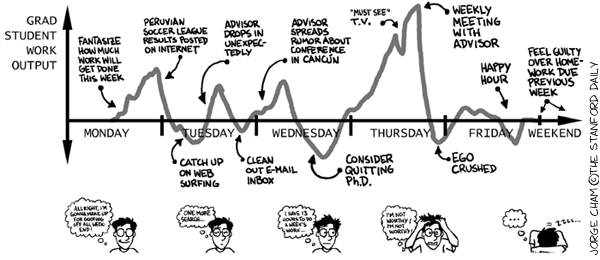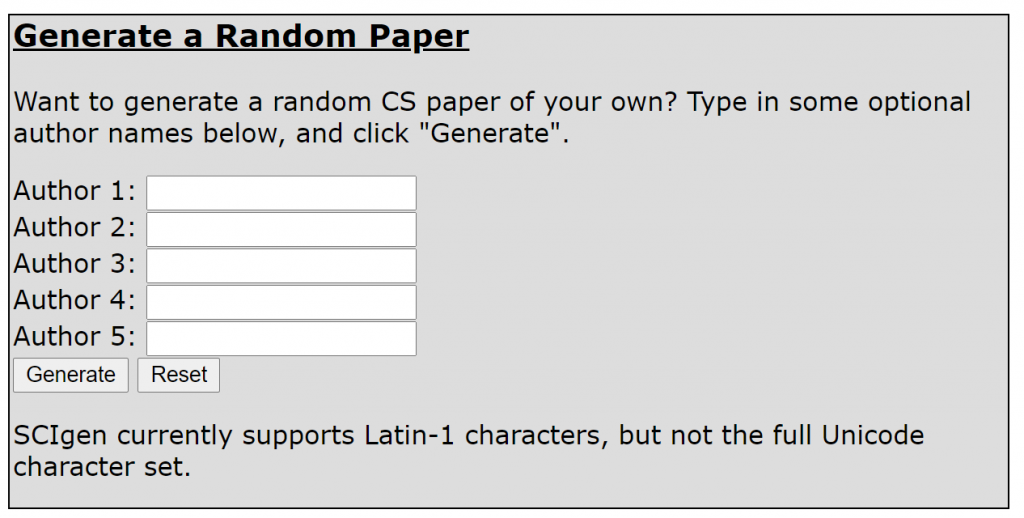Today I will talk about a few websites that are somewhat funny and are related to research.
Auto-reject ( https://autoreject.org/ )
This is a website that let you automatically generate reviews to reject papers. The reviewer need to check some boxes about what is the content of the paper, and then a review is generated. Note that it is not meant to be used by reviewers in real-life. It was created as an April fool’s joke. But it is interesting to try and see what kind of review is generated. For example, I generated a review:
Dear Author, Thank you very much for your submission. We have enclosed detailed reviews of your paper below. Reviewer 2 Generally speaking, this is interesting work which may well find some readers in the community. However, in its present form, the paper suffers from a number of issues, which are outlined below. Area Computer Science is not new. The past decade has seen a flurry of papers in the area, which would indicate progress and interest. However, the impact outside of Computer Science has been very limited, as is easily reflected in the ever-decreasing number of citations. Unfortunately, Computer Science finds itself in a sandwich position between a more theoretical community and a more practical community, which can both claim a bigger intellectual challenge and a greater relevance in practical settings. This is especially true for the field of Data mining, where the last big progress is now decades ago. As refreshing it feels to finally again see progress claimed in the field, the present paper must be read and evaluated in this context. Approach The paper suffers from an excess of formalism. Several important definitions are introduced formally only, without a chance to clearly understand their motivation or usage. The authors should be encouraged to make more use of informal definitions, building on the well-established formal definitions in the community. For readers, it is helpful to see the approach being demonstrated in a limited setting that facilitates control and comprehension. However, real-world settings are much more detailed, and much more challenging. If the approach is ever to succeed in practice, having a demonstrator that copes with real-world conditions is a must; the authors would be encouraged to work with industry to get access to appropriate settings and data sets. Evaluation This reviewer read until Page 2, and the evaluation seems to be okay. The fact that your evaluation involves students is also a cause for concerns - not only for ethical reasons, but also for the sake of generality. Generally speaking, results achieved with students cannot generalize to results achieved with the general public - especially not in Computer Science. You have to run your evaluation and experiments involving a wider range of subjects. Limitations The section on 'future work' fits into this very picture: There clearly is still a lot of additional work to do until this approach can begin to sho (...)
The code of that website is open-source but the approach is really simple if you look under the hood. A review is generated using some simple IF conditions.
Sh**t my reviewer say ( https://shitmyreviewerssay.tumblr.com/ )
If you have submitted several papers to journals and conferences, you will know that sometimes, we are not lucky and some reviewers can give some very bad comments rather than adopting a constructive approach. This website lists several bad comments given by reviewers. Here are a few examples:
- “Indeed, by the end of the paper, the reader is left with a feeling of ‘so what now?’”
- ” The fact that the question of this paper has never been asked should, on balance, count against the paper.”
- “Is this really a discovery or just the confirmation of math?”
- “I don’t see how your approach has potential to shed light on a question that anyone might have.”
- “The paper could be considered for acceptance given a rewrite of the paper and change in the title and abstract. “
- ” This discussion might be better directed to a different audience, perhaps an undergraduate class “
- “I am personally offended that the authors believed that this study had a reasonable chance of being accepted to a serious scientific journal.”
PhD Comics (http://phdcomics.com/ )
If you don’t know this website already, it offers some good cartoons about graduate student life. There are hundreds of comic strips, and some are really funny and to the point. When, I was a graduate student, I keep reading this every week. Although the author seems to have stopped uploading new comic strips, there is a big archive of old comics. There are also two movies that were made based on these comics called the PHD Movie 1 and PHD Movie 2.
The 200 most popular comic strips from this website:
http://phdcomics.com/comics/most_popular.php

SCIGEN – Automatic research paper generator ( https://pdos.csail.mit.edu/archive/scigen/ )
This website offers a tool to randomly generate computer science research papers. This was designed as a joke. But it is funny to try it and see what is generated. It can even generate some graphs and charts. To use the tool, all you need to do is fill the author names and click “Generate“:

Although papers generated by this tool generally do not make sense when you look at the details, some people have submitted generated papers to some predatory conferences to show that there is no review process and that the goal is just to get some money. You can see more details about that story on the website of SCIGEN.
Conclusion
That is all for today. I just wanted to share a few interesting websites that are not useful for your research but I think are funny or interesting.
If you have some other good websites, you may post them in the comment section below.
—
Philippe Fournier-Viger is a professor of Computer Science and also the founder of the open-source data mining software SPMF, offering more than 120 data mining algorithms.




